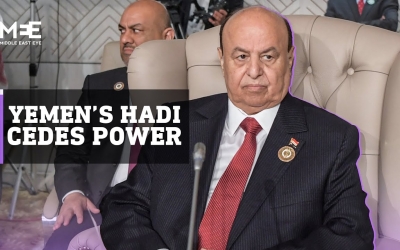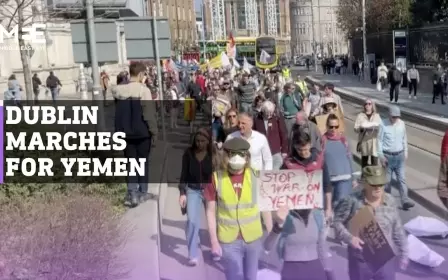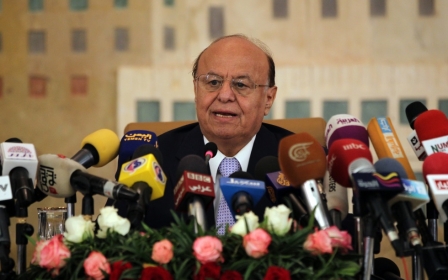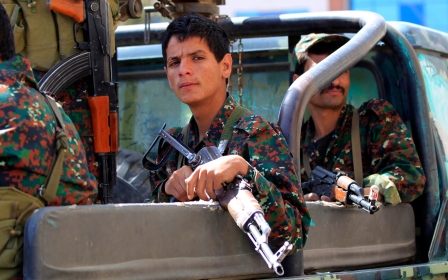Yemen's presidential council: A disparate new leadership imposed from abroad
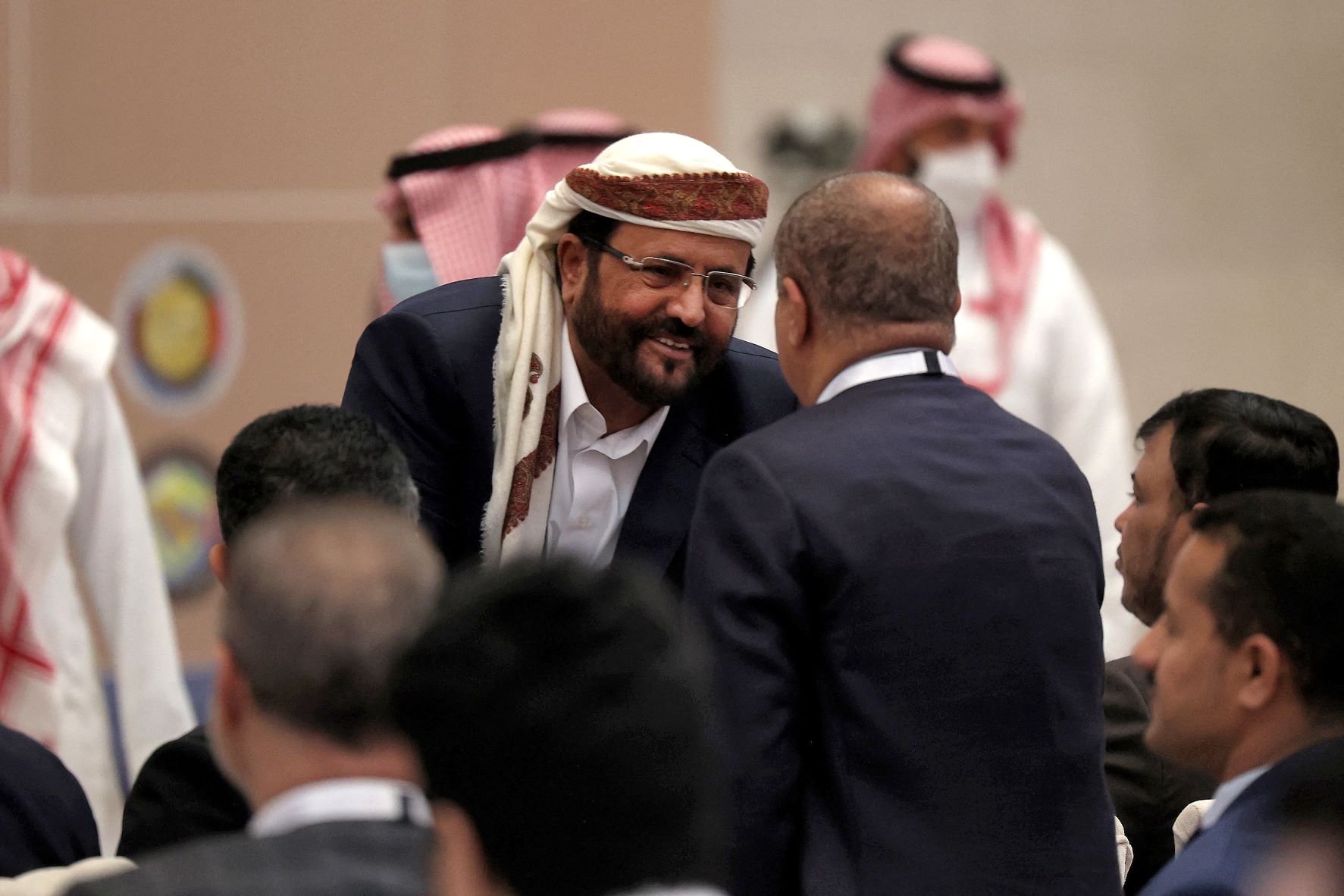
After 10 years overseeing Yemen's descent from post-Arab Spring optimism into catastrophic war and destitution, President Abd Rabbuh Mansour Hadi's rule is no more.
On Thursday, the beleagured leader of Yemen, who has for many years resided in neighbouring Saudi Arabia, announced that power would be handed over to a new presidential council.
"I irreversibly delegate to this presidential leadership council my full powers," announced Hadi in a televised statement, after days of talks in Riyadh.
The move was welcomed by Saudi Arabia, which promised in the wake of the announcement that it would provide $3bn in aid along with the UAE.
'You can't be optimistic in Yemen. The council wasn't formed through Yemeni-Yemeni talks, it was a result of exterior forces'
- Maysaa Shuja al-Deen, Sanaa Centre for Strategic Studies
The Iran-aligned Houthi movement, which has been fighting a Saudi-led coalition and forces loyal to Hadi for eight years, dismissed the development as "a desperate attempt to rearrange the ranks of the mercenaries".
New MEE newsletter: Jerusalem Dispatch
Sign up to get the latest insights and analysis on Israel-Palestine, alongside Turkey Unpacked and other MEE newsletters
Yemen analyst Adam Baron told Middle East Eye that the main purpose of the council was to unify the anti-Houthi forces in the country, which have become increasingly fractured by in-fighting and competing interests.
"The make-up of the council is largely split between different representatives of key political, societal and military groupings," he said.
"I wouldn't say it's UAE-dominated, though UAE-aligned people do make up a significant proportion of its members."
Among those involved are figures connected to the separatist Southern Transitional Council (STC), the powerful Giants Brigade militia, as well as Tareq Saleh, nephew of late Yemeni president Ali Abdullah Saleh. All have close ties to the UAE.
But a number of other figures in the council are linked to the Islah party, the Yemeni wing of the Muslim Brotherhood, which has long been deeply at odds with the UAE and its proxies.
Others were previously affiliated with the General People's Congress, the political party of Saleh's administration, which ruled Yemen from 1993 before being ousted in 2012 following the Arab Spring demonstrations.
The formation of the council comes against the backdrop of a United Nations-brokered truce that took effect last Saturday, marking the first day of Ramadan.
As drips of information from Saudi Arabia indicate that Crown Prince Mohammed bin Salman is increasingly determined to extract his country from the long-running conflict, many believe the move to unify the anti-Houthi bloc is a precursor to securing a final way out, even if it leaves the country mired in crisis for years to come.
"You can't be optimistic in Yemen. The council wasn't formed through Yemeni-Yemeni talks, it was a result of exterior forces," said Maysaa Shuja al-Deen, a senior researcher at the Sanaa Center for Strategic Studies.
"The participants and negotiators in the discussions in Riyadh did not know that a council was being formed. The decision to form the government does not have any Yemeni touch, which is worrying."
Make-up and mandate
Few would disagree that there was a need for a change in status quo.
"Hadi was a totally inefficient guy," said one analyst, who did not want to be named, describing the ageing and reportedly unwell leader as a "stumbling block" for any future negotiations.
Hadi, who was elected uncontested in 2012, said on Thursday he was ceding power to the new group, the composition of which was decided outside the country with little or no democratic mandate.
The new grouping, Hadi said, would be tasked with "negotiating with the Houthis for a permanent ceasefire".
There are eight members of the new presidential council:
-
Rashad al-Alimi - head of the new council and former adviser to Hadi
-
Tareq Saleh - nephew of Ali Abdullah Saleh and head of the UAE-backed National Resistance Forces
-
Aidarous al-Zubaidi - head of the UAE-backed separatist Southern Transitional Council
-
Gen Faraj al-Bahsani - governor of Hadramawt governorate
-
Abdullah al-Alimi Bawazeer - Islah-linked former director of the Office of the Presidency of the Republic
-
Sultan al-Arada - Former Marib governor and tribal leader
-
Abdel-Rahman Abu Zaraa - Leader of the UAE-backed Giants Brigades
-
Othman Megali - Former agriculture minister under Saleh and tribal leader in Houthi stronghold Saada
All maintain close links to either Saudi Arabia or the UAE, the countries that have dominated the anti-Houthi coalition since intervening in 2015. A number have nevertheless been at each others' throats since the beginning of the war.
In 2019, there were repeated clashes between Saudi-backed Hadi loyalists and the UAE-backed STC, and much of Yemen's south became embroiled in a struggle for territorial control between the two factions, despite them being nominally on the same side in the war.
The STC's desire for the eventual restoration of South Yemen, which previously existed as a sovereign state between 1967 and 1990, also puts it at odds with the Hadi and Saleh loyalists, who advocate continued unification.
Tareq Saleh was previously allied with the Houthis, until his alliance with the group broke down in 2017 and his cousin was killed by the movement in December that year.
Islah later denounced him as a puppet of the UAE, while the Islamist party has itself long been viewed with suspicion by the Emiratis owing to Abu Dhabi's long-running conflict with the Muslim Brotherhood.
The apparent success of negotiations in Riyadh at papering over these divisions has given hope to anti-Houthi Yemenis, though what will actually follow is another matter.
So far, there is little official information as to what constitutional and political powers the presidential council will have, beyond the mandate given by Hadi to negotiate with the Houthis.
A legal committee is set to decide on the extent of the new grouping's mandate, but it has yet to release a decision.
"It effectively reworks executive institutions in the Yemeni government," said Baron. "The entire shape of it is completely new."
'Incompetent' political elite
After seven years of war, Yemen has been left in ruins, while the country remains more divided than at any point since the 1994 war between north and south.
With hundreds of thousands dead and millions displaced and on the brink of famine, the desire for reconciliation, unity and an end to the fighting is widespread.
The Saudi-led coalition has agreed, as part of last Saturday's truce, to ease its longstanding air and sea blockade and allow commercial flights into the Houthi-controlled capital Sanaa, as well as fuel and more food shipments into the port of Hodeidah, also held by the movement.
So far, despite reports of minor breaches from both sides, the ceasefire has largely been holding. Though the Houthis rejected talks in the "enemy" territory of Saudi Arabia, there is hope for some kind of progress in future.
Shuja al-Deen, who pointed out that she had been one of those advocating the establishment of a presidential council since May 2021, said the main problem remained the lack of input from actual Yemenis.
"I was calling for a council that had a supervisory role rather than an executive role, to solve the problem of having a defunct parliament elected in 2003 and no longer representative of the country's main political stakeholders or the people," she said, pointing out that the parliament had met once, in 2019, since the beginning of the conflict.
She said the problem ultimately stemmed from an "incompetent" political elite and that simply shuffling the top deck of politicians, all of whom were beholden to foreign powers, would do little to effect change.
"The decision was made in Riyadh, without people's knowledge, without consultation with Yemeni political forces," she said.
"Instead, it was a result of a closed meeting between MBS with Hadi and some political actors."
Middle East Eye delivers independent and unrivalled coverage and analysis of the Middle East, North Africa and beyond. To learn more about republishing this content and the associated fees, please fill out this form. More about MEE can be found here.


